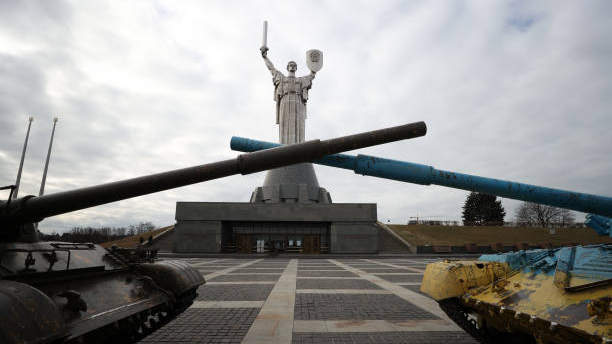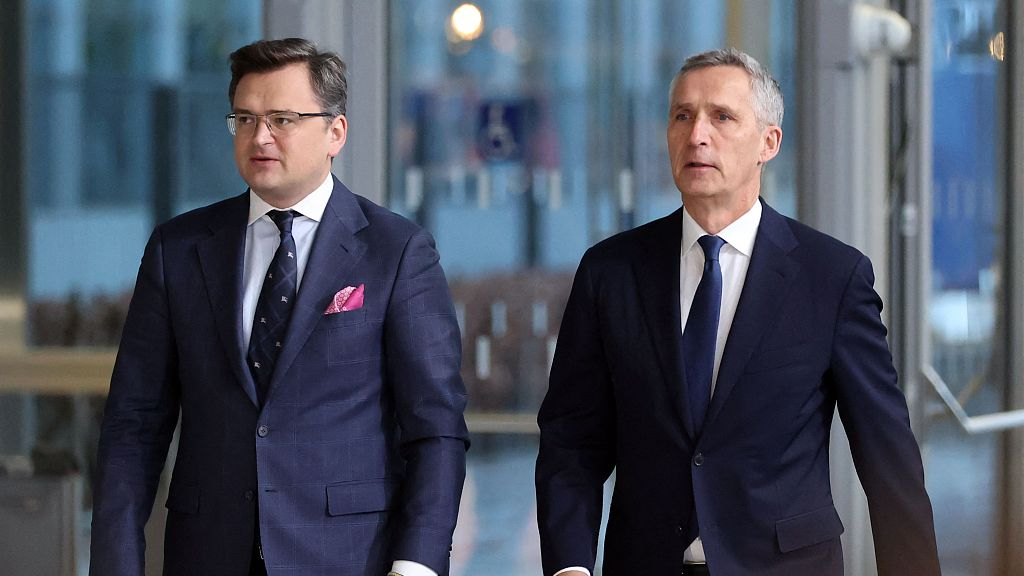
People visit Motherland Monument, a part of the National Museum of the History of Ukraine in World War II, as daily life continues despite growing tensions, Kyiv, Ukraine, February 21, 2022. /VCG
People visit Motherland Monument, a part of the National Museum of the History of Ukraine in World War II, as daily life continues despite growing tensions, Kyiv, Ukraine, February 21, 2022. /VCG
Editor's note: Jonathan Arnott is a former member of the European Parliament. The article reflects the author's opinions and not necessarily the views of CGTN.
In April 1961, Cuban rebels trained and equipped by the U.S. military set off from an air base in Nicaragua with the intention of mounting a coup against Fidel Castro's communist government. Their attacks did not succeed: what the United States believed would be a successful clandestine attack turned out to be "too large to be clandestine and too small to be successful."
The attacks set the stage for the Cuban missile crisis of 1962. Soviet Union moved nuclear missiles to Cuba, leading to a tense political and military stand-off between the USSR and the United States. Throughout the tense 13 days, U.S. President John F. Kennedy and Soviet Union's General Secretary of the Communist Party Nikita Khrushchev remained in contact. Negotiations succeeded in calming the tensions. Political tension and military stand-off can be resolved – if not amicably, then at least with less collateral damage than a situation where conflict is already underway.
Whether or not nuclear missiles in Cuba would have been an offensive threat to the U.S., the U.S. government clearly perceived them to be so. Likewise, whether or not Russia's concerns about NATO expansion eastwards are warranted, what matters in this context is that the Kremlin believes them to be. Direct comparisons between the Cuban missile crisis and the conflict in Ukraine are impossible, because the boot is on the other foot. They do help, however, for people on either side to understand how the other side is thinking today.
It is safe to say that relations between Russia and, for want of a better phrase, "Western countries," are at an all-time low. A series of European countries has expelled Russian diplomats, with Russia intending to respond in kind. But that is the symptom rather than the cause. Dialogue must continue, but there are two critical differences between the situation today and that of 1962.
Firstly, conflict is ongoing. Soldiers are dying on both sides, and there are numerous civilian casualties in Ukraine. There are accusations of war crimes, families who have lost loved ones. A diplomatic solution requires at the very least an agreement over territory, unlike a situation in which the Soviets and Americans could simply come to a peaceful understanding.

Ukraine's Foreign Minister Dmytro Kuleba (L) and NATO Secretary General Jens Stoltenberg arrive for a meeting of NATO foreign ministers in Brussels, Belgium, April 7, 2022. /VCG
Ukraine's Foreign Minister Dmytro Kuleba (L) and NATO Secretary General Jens Stoltenberg arrive for a meeting of NATO foreign ministers in Brussels, Belgium, April 7, 2022. /VCG
Secondly, we now live in a multimedia age. Photographs can be uploaded onto the internet and spread around the world in seconds. For all the years of protests against the Vietnam War, just one photograph – the so-called "Napalm Girl" – was pivotal in transforming American public opinion. Yet the photographs in Bucha are unlikely to similarly transform Russian public opinion against the war in Ukraine, even though it seems implausible that they could be fake. There will always be a different narrative pushed in Russia to that in the West. Even two bystanders witnessing a car accident often have wildly different perspectives of it. Even unbiased reporters might disagree to an extent, but biased reporters will disagree far more.
Fake news and propaganda can now be distributed at the touch of a button, to the extent that it becomes difficult to discern what is real and what is not. The type of information available to the average Russian citizen differs markedly from the information available to the average American citizen. This polarizes opinion, and there is evidence that Russian support of the war has solidified rather than wavered whilst Western support for Ukraine appears to be strengthening. Whereas once the weight of public opinion could have been relied upon to tend away from conflict, today that is no longer the case. Even far-right candidate Marine Le Pen in the French presidential election, currently enjoying a surge in the opinion polls, has softened her previously pro-Russia attitude.
One of the biggest tactical errors made by Western nations might well have been to tie Russian oligarchs to Russian President Vladimir Putin. Personal sanctions essentially link the oligarchs' fortunes to those of Putin, and therefore those same oligarchs become less likely to oppose Putin from within. Sanctions remain very much a double-edged sword precisely because they are undiscriminating, and because they play into a "rally round the flag effect." Western provision of training and weapons to Ukraine has proven effective; sanctions (except those with a direct military impact) have not. They may have an impact in the coming months, and whilst the Russian ruble has recovered, Russia has pegged its currency to gold (1 gram=5,000 rubles). Currency pegs have proved dangerous in the past: from Bretton Woods to the Exchange Rate Mechanism; from the Argentinian peso to Greek membership of the euro, long-term economic consequences are common. But for the time being, sanctions may have been politically counterproductive and economically ineffective.
The inescapable conclusion is that West-Russia relations cannot easily be repaired. The expulsion of diplomats is a symptom rather than a cause. The conflict shows no signs of abating any time soon. Ukraine's key advantages in Kyiv (supply, logistics, volunteer forces, terrain and the ability to fight on the defensive) are much reduced in the east and both sides face issues in a longer attrition phase of warfare. While the conflict continues, normalization of diplomatic relations seems impossible. Unlike the Cuban missile crisis, there exists no single compromise which could resolve the complexities of the current situation.
(If you want to contribute and have specific expertise, please contact us at opinions@cgtn.com. Follow @thouse_opinions on Twitter to discover the latest commentaries on CGTN Opinion Section.)

